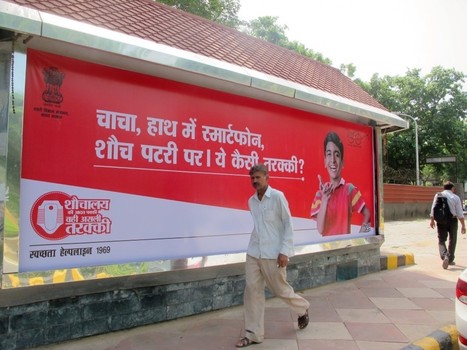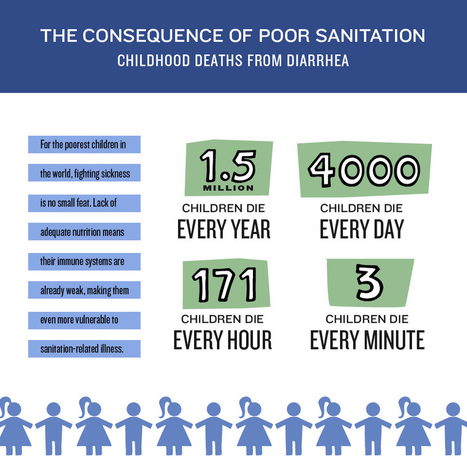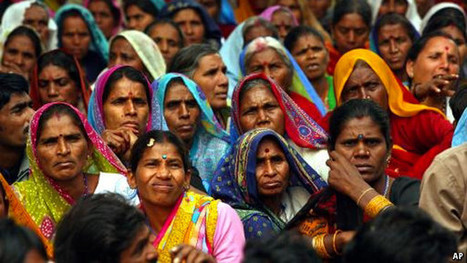"Television commercials and billboards now carry a message that strike at the heart of the Indian contradiction of being the world’s fastest-growing major economy and also where relieving oneself in the open is the norm in most villages. Research shows that one of the reasons for the stubborn social practice is the centuries-old caste system, in which cleaning human waste was a job reserved only for the lowest caste. Having a toilet at home is still considered unclean by many villagers. They regard it cleaner to go to the open farms, which can cause water-borne diseases, the second leading cause of death of Indian children younger than 5."
Get Started for FREE
Sign up with Facebook Sign up with X
I don't have a Facebook or a X account
 Your new post is loading... Your new post is loading...
 Your new post is loading... Your new post is loading...
Tanya Townsend's curator insight,
November 20, 2015 4:49 PM
Often when people are faced with a tragic fact they instantly attempt to shut it out because it makes them uncomfortable. In the same way Americans can walk past five homeless people a day and not bat and eye...its easier. Using comedy to address a dire situation such as India's sanitation standards, is an ingenious way to get people to actually listen 
Taylor Doonan's curator insight,
March 30, 2018 5:17 PM
This page tackles the problem of the lack of toilets in India. There are many comedians poking fun at the serious issues, which is not uncommon for comedians. Unfortunately these are serious issues, people are dying, especially children. 24% of girls drop out of school due to lack of proper toilets. Hopefully these comedians bring more light to the issue so it can begin to be addressed more seriously.
|

Chris Costa's curator insight,
November 15, 2015 2:18 PM
I was unpleasantly surprised to learn that all these statements are indeed true. Reading about the struggles India has endured with the lack of indoor plumbing many of its people must endure made me think of a previous article I had read about the "Two Mexico's." Rapid development in certain areas for certain people has revolutionized the standard of living for some, but the persistence of corruption has lead to economic lag for many of the people of both nations, meaning significant portions of the population are being left behind during this period of development. The sanitation and plumbing systems of inca are woefully inadequate for a country of over a billion people, subtracting from the leaps that have been made in other areas. The dangers faced by women as a result of the lack of indoor plumbing was a surprise, although it does make sense. Millions of Indian women have to resort to walking to communal bathrooms, oftentimes at night on solitary trips, which leaves them vulnerable to the kids of sexual assault that have plagued Indian media. I hope for the sake of the Indian people that improvements in the rates of indoor plumbing in the country continue to be made. 
Matt Ramsdell's curator insight,
December 14, 2015 2:46 PM
One thing about this issue is the fact that most of the people living in the area dont have the proper sanitation. Many of the issues that they face are a lack of government and funding and jobs. However the issue in India is the worst within the world. China has a huge lack of sanitation but in India the situation is much worse.
Adam Deneault's curator insight,
December 14, 2015 6:38 PM
Something like this just disgusts me, first off there are more cell phones in this country than toilets... how does a government allow that to happen? Clearly, the answer is, they must not care because there is lack of governmental help. These people do not have toilets in there houses, they have to go down the street to a public restroom where thousands of people go a day both sick and healthy, so there are probably terrible sicknesses running rampant. Hopefully for them, they do not get a life threatening disease that will kill off the population.

Chris Costa's curator insight,
November 15, 2015 2:51 PM
It was interesting to read about Modi's run for prime minister- I recently read a TIME magazine article about him, his original platform, and his subsequent work in office- and to see so much of Obama's run for office in Modi's struggle. Modi's support among his own caste, traditionally one that has been discriminated against in Indian society, is not at all different from Obama's support among the African American community. It goes to show that, for all our differences, people are a lot more alike then we'd care to think. Beyond that, it was interesting to see how much power the old caste system continues to hold in Indian society, much like the issues with race that Americans continue to struggle with within our own society. Appeals to different castes have been employed successfully by politicians and other forms of media; I once read that the most popular Indian films are often love stories revolving around "forbidden love" between two members of different, opposite castes. In a society that is so rich and complex, with hundreds of different languages and beliefs, it is so easy for lines to be drawn and for differences to be focused upon in a negative light. Happily for India, it has come a long way to address these problems and to move forward. While not perfect, India's future looks bright. 
Martin Kemp's curator insight,
December 17, 2015 3:34 PM
i dont understand how a country like india that is mostly modern and on the world scale can still have such an ancient system of labeling people be such a prominent practice in their society, i hope modi gets elected so he can start to eliminate this
Stevie-Rae Wood's curator insight,
December 9, 2018 4:58 PM
The caste system in India still takes place today because it is slow to change. Even though Gandhi went to extreme measures to end the caste system. A caste system is a hierarchy of beings based on heredity. So if your not one of the lucky ones who is born into a top caste there is virtually no way of climbing the social ladder. In elections in particular voters all across the nation are swayed by the caste of the candidates. Caste is also very prominent in rural areas. If someone were to marry someone of a lower caste in rural areas they could face death because that is disrespectful to the norms of these particular areas. Even though many caste laws have been eradicated to benefit the people its still the people that are practicing this tragic system. Its tradition to them, some cannot see past the social injustices that this type of system permits. |














